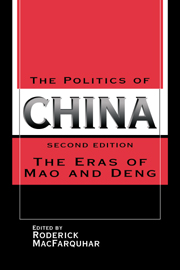Book contents
- Frontmatter
- Contents
- Preface
- List of tables and maps
- List of abbreviations
- Introduction
- 1 The establishment and consolidation of the new regime, 1949–57
- 2 The Great Leap Forward and the split in the Yan'an leadership, 1958–65
- 3 The Chinese state in crisis, 1966–9
- 4 The succession to Mao and the end of Maoism, 1969–82
- 5 The road to Tiananmen: Chinese politics in the 1980s
- 6 Reaction, resurgence, and succession: Chinese politics since Tiananmen
- Appendixes: Leaders and meetings
- References
- Index
Introduction
Published online by Cambridge University Press: 05 June 2012
- Frontmatter
- Contents
- Preface
- List of tables and maps
- List of abbreviations
- Introduction
- 1 The establishment and consolidation of the new regime, 1949–57
- 2 The Great Leap Forward and the split in the Yan'an leadership, 1958–65
- 3 The Chinese state in crisis, 1966–9
- 4 The succession to Mao and the end of Maoism, 1969–82
- 5 The road to Tiananmen: Chinese politics in the 1980s
- 6 Reaction, resurgence, and succession: Chinese politics since Tiananmen
- Appendixes: Leaders and meetings
- References
- Index
Summary
On 1 October 1949, Mao Zedong proclaimed the foundation of the People's Republic of China from the Gate of Heavenly Peace (Tiananmen) in the heart of Beijing. The Chinese people had “stood up,” Mao declared. A century of foreign aggression and civil war was coming to an end. Even those who rejected Marxism and feared the Chinese Communist Party (CCP) could welcome the prospect of peace, unity, and the chance to rebuild China. The CCP had seized the traditional “mandate of heaven.”
Forty years later, Mao's eventual successor, Deng Xiaoping, presided over National Day celebrations in a very different atmosphere. The Chinese people had again stood up, in Tiananmen Square six months earlier, but this time in defiance of the Communist government and in search of democratic change. The movement had been put down by military force on 4 June 1989, but so fearful were the Beijing authorities of renewed trouble that the 1 October anniversary had to be marked under conditions of martial law. It was a dismal contrast to that confident day of hope and determination forty years earlier. In his final years Deng pressed forward with economic development to try to restore the CCP's lost mandate.
Chapter 1 describes how the CCP established its power in impressive fashion, rehabilitating and then developing the economy and appearing to transform society. By the mid-1950s, China was widely respected abroad for its relative success in tackling the problems of nation building and backwardness.
- Type
- Chapter
- Information
- The Politics of ChinaThe Eras of Mao and Deng, pp. 1 - 4Publisher: Cambridge University PressPrint publication year: 1997



